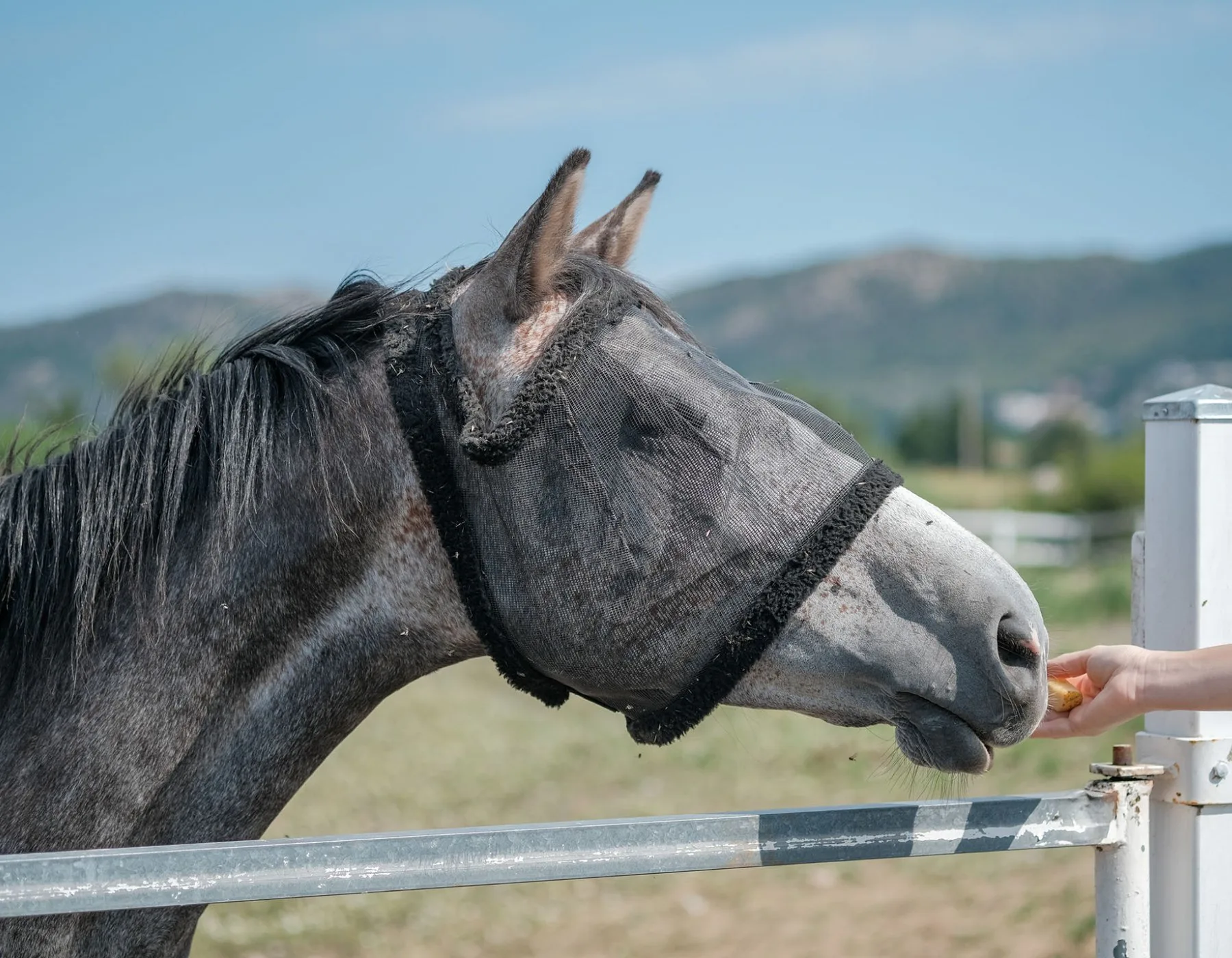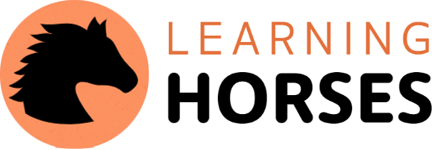Before you bring your horse home, you will need a specific list of horse supplies to feed, groom, and care for your horse. In this article, you will find a basic guide to the supplies you need for the first year of owning a horse – including an explanation of each item and why it should be included in your list of horse supplies.
To prepare for your first year of owning a horse, here is a list of important supplies for you and your horse.

Supplies For Your Horse:
There are a lot of supplies you will need to keep your horse happy and comfortable in their new life with you.
Living Quarters
The first thing you will need for your horse is a place for them to live and sleep. If you are boarding them, then finding a nice barn that you both will be happy at is the first step. If you are keeping them on your own property, then they will need a stall or covered shelter, a pasture, and a barn to store their feed and supplies. (If you’re looking for an inexpensive way to create a shelter, you can always DIY a horse stall.)
Feed Buckets and Water Access
Your horse will need some kind of feed bin to eat out of. This depends on personal preference for you and your horse.
- Feed Buckets. Some people prefer a feeder or bucket on the wall, while others prefer a rubber tub on the ground.
- Feeding from the Ground. Other horse owners prefer to put the hay on the ground, and grain can be poured on top of that. If you do choose to feed on the ground, make sure the area is swept clean first to avoid your horse eating any dirt or bedding.
- Feed bags that strap onto the horse’s head are another option perfect for some farms. You can read more about using feed bags in our article.
Regardless of what you choose, it is best to have a plan before your horse arrives, and then adjust it as needed. They will also need constant access to water, both in their stall and in their pasture. Options for water include buckets, troughs, and automatic waterers.
Grooming Supplies
When you buy your first horse, you will also want to put together a grooming box for them. This will be filled with all of the grooming supplies you will need for your horse, including brushes (both hard and soft), hoof picks, a curry comb, a shedding blade, and a mane and tail comb. It is also a good idea to include a mane and tail detangler, as well as some fly spray for the summertime.
First Aid
It is always a good idea to have first aid supplies on hand at the barn and in the trailer – for both people and horses. Accidents can happen at any time, and you should always aim to be prepared with the basics. First aid kits should always be clearly marked and easily accessible. For people, make sure to have an assortment of Band-Aids (different shapes and sizes), and antiseptic ointments.
For horses, make sure to have enough supplies on hand to hold them over until a vet can get there. Some important supplies to have are:
- Gauze bandages
- Self-adhesive bandages to hold the gauze in place
- Antiseptic ointments, including a wound cream, iodine, and hydrogen peroxide
- Saline solution
- Thermometer
- Stethoscope
- Latex gloves
- Pain reliever, such as phenylbutazone (bute)
- Duct tape
💡📄 The University of Guelph has a great printable for building a horse first aid kit.
Tack
When you own your own horse, you will also need your own tack. And the most important pieces of tack you will need for your new horse are a halter and lead rope. You will also need to find a saddle that fits both you and your horse comfortably. If you do not already know what kind of bit works best for your horse, you may need to try a few different ones until you find the right fit for them. If you love the idea of all-matching tack, this is the perfect time to pick a color scheme for you and your new horse.
Blanket
Whether or not you decide to include a blanket in your horse supplies for your new horse depends on a few things. Not everyone likes to blanket their horse, and not every horse needs a blanket. It mostly comes down to personal preference, the age of the horse (older horses will benefit from a blanket the most), and if your horse grows a thick enough coat for the climate they are in. Some people choose to blanket their horses to keep them cleaner.
Fly Mask

Fly masks are a great way to keep annoying insects off of your horse’s face. Horses are bothered by flies buzzing around their faces just as much as people are, which can make summer afternoons particularly brutal for them. A fly mask will help with this. Also, if your horse has a lot of white on their face, especially around their eyes or muzzle, a fly mask will help protect them from sunburn.
Barn Supplies:
If you are keeping your horse on your own property, there are even more supplies you will need to get to prepare for your first year of horse ownership.
Cleaning Supplies
The most important chore when it comes to horses kept in a barn, is making sure they have a freshly cleaned stall every day. This means investing in a durable wheelbarrow and pitchfork for your barn. Also, have a plan in place for where the manure will be dumped. Ideally, you’ll want it somewhere that isn’t in the way, but also close to the barn for easy access. Other important items for keeping your barn nice and tidy are a broom and a dustpan. This way you can keep the aisleways cleared of any debris.
Feed Storage Bins
It will be necessary to have feeding supplies for your horse. This means having a place to keep the feed, as well as secure bins for storing grain, supplements, or other feed. Grain and supplements should be kept in bins with secure lids. Trash cans make great grain bins. Having a tightly secured lid will ensure there are no accidental grain spills, and will help keep mice or other rodents out of the bins.
Secure Fencing and Gates
Having secure and safe fencing is extremely important when it comes to horses. It is necessary to keep your horse from getting loose. If they get out, they could end up running onto a road, or going onto a neighbor’s property where they could cause damage, or injure themselves. The fencing itself also needs to be safe for horses. Wood fences and some types of wire fences are very common, but both come with pros and cons. It is best to do research first before choosing a fence type. It is also a good idea to get input from a trainer or neighbor/friend with horse-owning experience.
Three horse supplies you actually don’t need in the first year of horse ownership
It’s easy to get carried away with a shopping list for first horse. It’s a fun to purchase grooming supplies, tack, and accessories. But all that horse shopping can add up! Here are a few things you can easily cull from your shopping list that will help save money on your horse in the first your ownership:
Horse blankets and sheets
There is a huge variety of blankets and sheets for horses – ranging from summer fly sheets to heavy turnout blankets that cover a horse from ears to tail. But for the vast majority of horses, none of these are necessary. It must you live in a very extreme climate, have an elderly horse, or will be competing in horse shows in the winter or early spring, your horse does not need blanketed. Every horse is different, but for the most part, horses are very well equipped to handle cold – especially if they have shelter. Read more on tips to know when to blanket your horse.
Supplements and vitamins
a flip through major equestrian catalogs is sure to convince you that your horse needs a number of special additives added to their grain at feed time. This is rarely the case. Horses have evolved to get all the nutrition they need from grass, high-quality hay, minerals, salt, and grain as needed. You don’t need to add special supplements to your horse’s feed unless your veterinarian recommends that you do so based on nutritional testing. Additionally, if you feed a complete pelleted food, you can trust that your horse’s food is lab tested to provide complete nutrients.
Extra tack and grooming tools
sure, a bareback pad and a horse vacuum can be fun items to have that may even make your horse chores shorter, but they are necessary. Evaluate the things on your horse shopping list in the first year and cross out anything that isn’t essential. It’s good to spread out your horse supply budget over several years. The vast majority of horse equipment is designed for heavy-duty use and will last multiple years, so it’s important to purchase the essentials in the first year and delay the purchase of accessories that are just for fun or for making chores easier.
Conclusion
Buying a horse is a huge responsibility, and they require a lot of different supplies. Horses are very expensive to purchase- even before considering the cost of horse supplies you’ll need in the first year. They require a lot of supplies to keep them happy and healthy. It can be tough to know exactly what you need for your first year together. A great idea is to start with a list of basics, and build from there as you discover new needs.
If you have any additional suggestions for supplies in the first year of horse ownership, leave a message in the comments!
